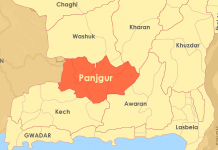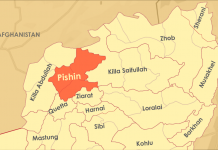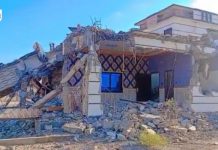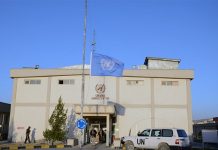Continuous rainfall has been reported in over 22 districts of Balochistan, with protests erupting in Gwadar on the fourth consecutive day of precipitation. While Gwadar experienced a pause in rainfall, older areas of the city are submerged in stagnant water.
Due to water overflowing onto roads and landslides, ground communication has been disrupted in some districts. The Zhob-Dera Ismail Khan Highway and Quetta-Harnai Highway have been closed for traffic, impacting both local and international travel, including the train service between Pakistan and Iran.
According to the Meteorological Department, Gwadar’s Jeewani area recorded the highest rainfall of 72 millimeters in the past 24 hours. Other rainfall figures include 59 millimeters in Gwadar district, 54 in Qalat, 34 in Khuzdar, 30 in Sibi, 20 in Turbat, and 16 in Quetta.
Following the rainfall, floodwaters accumulated various areas of Kharan, disrupting ground connections between Kharan and other cities. The Provincial Disaster Management Authority (PDMA) reported the tragic incident of a wall collapse in Kallan area of Kharan, claiming the lives of three children on Thursday.
In Chagai and Nushki, torrential rainfall caused landslides, affecting the Quetta-Zahedan railway track in both districts. Train services between Pakistan and Iran have been suspended due to tracks damaged by rainwaters.
The Gwadar population, especially in older settlements, staged protests by blocking roads on Marine Drive, expressing frustration over the lack of timely relief efforts. Protesters claimed that despite three days passing, water could not be drained from their homes. Emergency response efforts are slow, and if water is not removed promptly, their homes could be at risk.
Residents reported water accumulation up to six feet in houses and alleyways, rendering most residences uninhabitable. Women are forced to stay in schools, while men seek refuge in mosques.
In Pishin, the Khuda-e-Dad Zai area witnessed road damage due to flooding, severing land connections with neighboring villages. In the Shahrag area of Harnai, a bridge collapse blocked the Quetta-Harnai route, disrupting the link between Quetta and Harnai.
In Sherani, the Zhob-DI Khan Highway, connecting Balochistan to Khyber Pakhtunkhwa, was closed for traffic due to a landslide caused by large rocks falling from the mountains. A passenger bus and a car carrying dozens of individuals were stuck, requiring a rescue operation to transfer them to a safer location.
In Sorab district, on the Quetta-Karachi highway, a passenger bus overturned due to slippery roads after rainfall, resulting in seven injuries.
In Jhal Magsi, underwater conditions were reported in low-lying areas due to heavy rain. The road connecting Gandhawa, the district headquarters, to Notal was closed for traffic.
The Meteorological Department predicts a cessation of the rainfall sequence in the next 24 hours in many Balochistan regions. However, they have also issued a severe cold weather warning for upper areas, including Quetta, where temperatures may drop to negative five degrees Celsius.
Meanwhile, the Baloch Yakjehti Committee (BYC) leader Doctor Mahrang Baloch has reached Gwadar as part of her visit to the region. Dr. Mahrang arrived in Gwadar to express solidarity with the residents and provide assistance in the aftermath of the devastating events following recent heavy rainfall in the area.
Prior to her visit, the BYC had decided to gather funds through BWI (Baloch Welfare International) in Karachi and extend as much help as possible to these affected regions. The committee emphasized the importance of unity in such challenging times and urged individuals willing to stand by them during this crisis to contact and join hands. The public announcement highlighted the invitation to those who wish to actively participate in fulfilling their national duty.






























